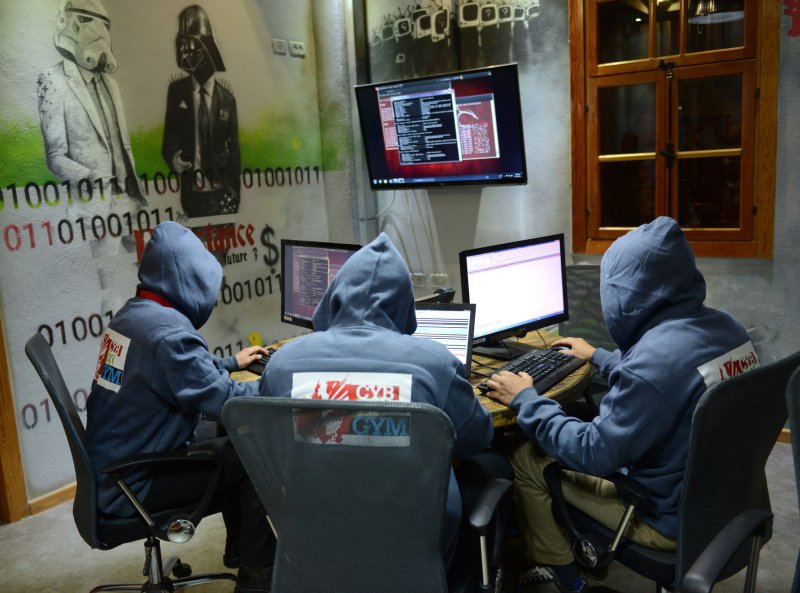Israelis work on computers at the 'CyberGym' training facility in Hadera, Israel, October 30, 2013. Israel's military Chief of Staff Benny Gantz warned that a sophisticated cyber-attack could cripple Israel in a future war scenario. The 'CyberGym' provides hands-on experience in all aspects of cyber defense during real cyber-attacks. UPI/Debbie Hill |
License Photo
WASHINGTON, June 11 (UPI) -- In 1997, CSIS issued a global alert about what it warned was a coming wave of financial crime on the Internet. Experts pooh-poohed the CSIS report and said it was irresponsibly alarming.
Five years ago, it became clear that losses were mounting rapidly into the billions of dollars but governments kept a stiff upper lip.
No more. Sponsored by McAfee, part of Intel Security, a CSIS report released this week estimates the global cost of financial crime on the Internet at $400 billion a year worldwide. Cybercrime is likely to remain a growth business for years to come, it warned.
Other key findings say the global costs of cybercrime to companies range up to $575 billion per year.
Cybercrime costs jobs -- some 200,000 a year in the U.S. and about 150,000 in the EU. Experts consider this estimate to be on the low side as a third of the 196 countries in the world produce no data on the ravages of cybercrime. Accurate stats are shunned by governments lest they be voted out of office for incompetence.
The embarrassing fact for corporations and governments is that cybercrime downgrades employment from high to low income jobs.
More and more people are online every day -- almost half the world's population of 7 billion. And the costs of cybercrime will continue to soar unless new tools are developed.
Insurance companies offer limited protection that is full of loopholes. Losses are hard to assess. Many cyber gangsters operate from Caribbean and South Pacific islands whose governors are frequently cyber ignorant. Criminals can re-route their activities through several countries in a matter of seconds, confusing law enforcement trackers and concealing the origin of the attack.
Without cybercrime, say the experts, the returns on innovation would double. And the beneficiaries of stolen intellectual property "are getting better at exploiting it."
"Cybercrime is a tax on innovation and slows the pace of global innovation by reducing the rate of return to innovators and investors," said Jim Lewis, senior Fellow and Director of the Strategic Technologies Program at CSIS.
CSIS found that the U.S. notified 3,000 companies in 2013 they had been hacked. In the UK, retailers lost almost $1 billion to hackers.
Australia estimated cyber attacks against an airline, hotel chain, and financial services companies at $100 million.
The CSIS report also estimated that global losses "related to personal information intrusions could reach $160 billion." Forty million people in the U.S., said the CSIS report, or roughly 15 percent of the population, "have had their personal information stolen." High-profile breaches around the world, the report added, "reached 54 million in Turkey, 20 million in Korea, 16 million in Germany and 20 million in China."
In Italy, "hacking losses totaled $875 million, "but clean-up costs reached $8.5 billion." Yes, that's billion.
In total, 40 million people in the U.S. and 800 million worldwide had documents stolen in 2013. Recovery is a slow painful process.
The only effective cure to soaring costs is ever closer multinational cooperation. Last week, CSIS reported, "11 nations announced the takedown of a crime ring associated with the GameOver Zeus botnet."
CSIS' partner for this report, McAfee, part of Intel Security (subsidiary of Intel Corporation) "empowers businesses, the public sector, and home users to safely experience the benefits of the Internet." But it will be a long time before anyone feels their family savings are safe on the Internet.
Whichever way you slice, it's a huge chunk of the profit margin in Western enterprises. Russia and China have not disclosed or estimated their losses. Millions still pay their bills by mail rather than risk interception of their banking practices online.
If cybercrime were a country, said the CSIS report, it would have the 27th largest economy in the world.















